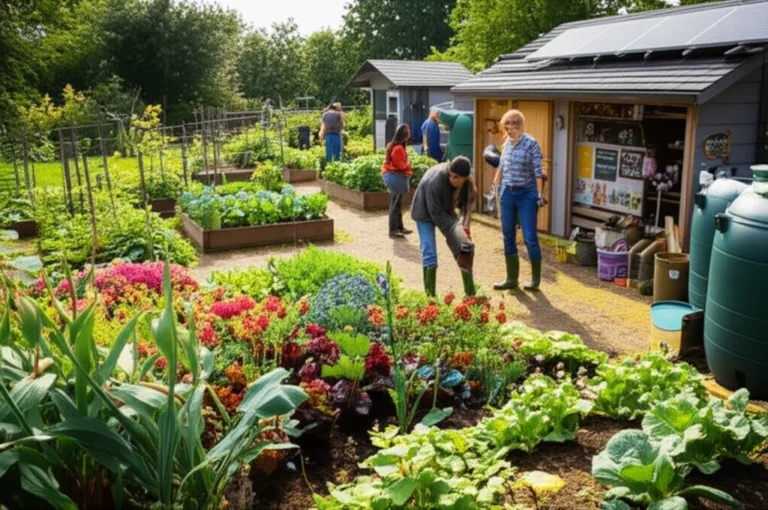Support our educational content for free when you purchase through links on our site. Learn more

Quick Answer: Urban gardens provide numerous environmental benefits, including reducing greenhouse gas emissions, improving air quality, conserving water, promoting biodiversity, and mitigating the urban heat island effect. They also contribute to sustainable food production, reduce food miles, and foster community engagement. Explore the many ways urban gardens positively impact the environment and learn how you can get involved in this green movement.
Imagine a bustling cityscape with towering buildings, concrete sidewalks, and busy streets. Now, picture vibrant green spaces nestled within this urban jungle, teeming with life and contributing to a healthier environment. Urban gardens are transforming cities worldwide, offering a multitude of benefits for both the environment and the people who inhabit them. In this article, we’ll delve into the ways urban gardens are good for the environment, exploring their positive impact on air quality, biodiversity, water conservation, and more. So, grab your gardening gloves and let’s dig in!
Table of Contents
- Quick Answer
- Quick Tips and Facts
- Background: The Rise of Urban Gardens
- Reducing Greenhouse Gas Emissions
- Improving Air Quality
- Conserving Water
- Promoting Biodiversity
- Mitigating the Urban Heat Island Effect
- Sustainable Food Production
- Reducing Food Miles
- Fostering Community Engagement
- FAQ
- Conclusion
- Recommended Links
- Reference Links
Quick Answer
Urban gardens are good for the environment in numerous ways. They:
- ✅ Reduce greenhouse gas emissions
- ✅ Improve air quality
- ✅ Conserve water
- ✅ Promote biodiversity
- ✅ Mitigate the urban heat island effect
- ✅ Contribute to sustainable food production
- ✅ Reduce food miles
- ✅ Foster community engagement
CHECK PRICE on: Urban Garden Kits | Vertical Planters | Compost Bins
Quick Tips and Facts
Before we dive into the details, here are some quick tips and facts about urban gardens and their environmental benefits:
- Urban gardens can be created in various forms, including rooftop gardens, community gardens, vertical gardens, and indoor gardens.
- Green spaces in cities help reduce the urban heat island effect, where cities become significantly hotter than surrounding rural areas.
- Urban gardens provide habitats for pollinators, such as bees and butterflies, which are crucial for plant reproduction and biodiversity.
- Growing food locally in urban gardens reduces the need for long-distance transportation, lowering carbon emissions from food miles.
- Community engagement in urban gardens fosters social connections, improves mental well-being, and strengthens neighborhood resilience.
Now, let’s explore each of these benefits in more detail.
Background: The Rise of Urban Gardens

In recent years, urban gardens have gained popularity as people recognize the importance of sustainable living and the need to reconnect with nature. These green spaces in the heart of cities offer a respite from the concrete jungle and provide numerous environmental benefits. As urbanization continues to expand, urban gardens play a vital role in creating a more sustainable and livable future.
1. Reducing Greenhouse Gas Emissions
Urban gardens contribute to the reduction of greenhouse gas emissions, which are a major driver of climate change. By growing food locally, urban gardeners reduce the carbon footprint associated with long-distance transportation and the energy-intensive processes involved in industrial agriculture. Additionally, urban gardens sequester carbon dioxide through photosynthesis, helping to mitigate the effects of climate change.
2. Improving Air Quality
In densely populated cities, air pollution is a significant concern. Urban gardens act as natural air filters, absorbing pollutants and releasing oxygen. Plants remove harmful gases, such as carbon monoxide, nitrogen dioxide, and volatile organic compounds, from the air, improving overall air quality. By creating pockets of greenery, urban gardens help combat the negative health effects of air pollution and create a healthier living environment for city dwellers.
3. Conserving Water
Water scarcity is a pressing issue in many parts of the world. Urban gardens play a crucial role in water conservation by promoting sustainable water management practices. Through techniques like rainwater harvesting, drip irrigation, and mulching, urban gardeners minimize water waste and ensure efficient use of this precious resource. By demonstrating responsible water usage, urban gardens inspire others to adopt water-saving practices in their own lives.
4. Promoting Biodiversity
Cities are often seen as concrete jungles devoid of wildlife. However, urban gardens provide vital habitats for a diverse range of plant and animal species. By creating green spaces and incorporating native plants, urban gardeners attract pollinators, birds, and beneficial insects, contributing to biodiversity conservation. These mini-ecosystems within cities help restore balance to urban environments and support the interconnected web of life.
5. Mitigating the Urban Heat Island Effect
The urban heat island effect refers to the phenomenon where cities experience significantly higher temperatures than surrounding rural areas. This is primarily due to the abundance of heat-absorbing surfaces like concrete and asphalt. Urban gardens help mitigate this effect by providing shade, evaporative cooling, and reducing surface temperatures. By creating green oases, urban gardeners cool down their immediate surroundings and create more comfortable microclimates.
6. Sustainable Food Production
One of the most significant benefits of urban gardens is their contribution to sustainable food production. By growing food locally, urban gardeners reduce the reliance on industrial agriculture, which often involves the use of synthetic fertilizers, pesticides, and long-distance transportation. Urban gardens prioritize organic and regenerative practices, ensuring the production of nutritious, chemical-free food for local communities.
7. Reducing Food Miles
Food miles refer to the distance food travels from the farm to the consumer’s plate. Urban gardens significantly reduce food miles by bringing food production closer to urban centers. This reduces the carbon emissions associated with long-distance transportation and supports a more localized and resilient food system. By growing food in their own neighborhoods, urban gardeners decrease their dependence on imported produce and support local farmers.
8. Fostering Community Engagement
Urban gardens serve as gathering places for communities, fostering social connections and promoting a sense of belonging. They provide opportunities for people of all ages and backgrounds to come together, learn from one another, and share their love for gardening. Community engagement in urban gardens strengthens social ties, improves mental well-being, and empowers individuals to take an active role in shaping their urban environment.
FAQ

How are gardens good for the environment?
Gardens are good for the environment in several ways. They reduce greenhouse gas emissions, improve air quality, conserve water, promote biodiversity, and mitigate the urban heat island effect. Gardens also contribute to sustainable food production, reduce food miles, and foster community engagement.
Read more about “What Problems Do Gardens Solve? … 🌱”
How do community gardens help the environment?
Community gardens help the environment by providing green spaces in urban areas, reducing the urban heat island effect, improving air quality, and promoting biodiversity. They also contribute to local food production, reduce food miles, and create opportunities for community engagement and education.
Read more about “How Do Gardens Help the Environment … 🌿”
Why do we need urban gardens?
Urban gardens are essential for creating sustainable and livable cities. They provide numerous environmental benefits, including reducing greenhouse gas emissions, improving air quality, conserving water, and promoting biodiversity. Urban gardens also contribute to local food production, reduce food miles, and foster community engagement.
Read more about “How Does Community Garden Work? … 🌱”
Are urban gardens good for ecosystems and humans?
Yes, urban gardens are beneficial for both ecosystems and humans. They provide habitats for pollinators and other wildlife, contribute to biodiversity conservation, and improve overall ecosystem health. For humans, urban gardens offer opportunities for physical activity, stress reduction, and community building. They also provide access to fresh, nutritious food and promote sustainable living practices.
Conclusion

Urban gardens are not just beautiful green spaces in the midst of concrete landscapes; they are powerful agents of change, positively impacting the environment and the communities they serve. By reducing greenhouse gas emissions, improving air quality, conserving water, promoting biodiversity, and mitigating the urban heat island effect, urban gardens play a vital role in creating sustainable and resilient cities. They also contribute to sustainable food production, reduce food miles, and foster community engagement. So, whether you have a small balcony or a sprawling rooftop, consider starting your own urban garden and join the green movement today!
CHECK PRICE on: Urban Garden Kits | Vertical Planters | Compost Bins
Recommended Links
- Benefits of Community Gardens
- Community Garden Events
- Community Garden Policies
- Gardening for Beginners
- Garden Design Ideas
- What Problems Do Gardens Solve? 2024 🌱





